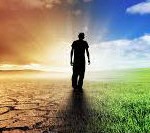December 2014
Frans Berkhout, director of Future Earth | The Guardian

People attend a candlelight vigil before the inauguration of this year’s climate change conference in Lima, Peru. Photograph: Martin Mejia/AP
This year has seen a huge number of development challenges arise or worsen. The Ebola outbreak in west Africa still defies attempts at containment. A new climate agreement is still in question while global greenhouse gas emissions rise largely unchecked. Millions of people are facing a food crisis as funding dries up and extreme weather events disrupt farming. Theglobal economy is languishing, inequality is putting pressure on social and political systems, and ecosystems are under threat.
Human activity has come to dominate many of the Earth’s life-support systems, but are societies prepared to address these challenges? Are we even able to assess the risks they pose to our wellbeing? Science can play an important role, but research programmes must become more interconnected if we are to address today’s most pressing developing challenges – from improving health, food security and access to clean energy and water, to understanding how demographic shifts affect our production and consumption patterns.
What caused the Ebola outbreak?
While much of the attention on Ebola has been on containment and treating those affected, other research is trying to understand the root causes of the outbreak. The majority of known human infectious diseases are zoonotic – they are shared with animals. Human activities such as deforestation, agricultural expansion, and hunting and trade of wildlife can lead to increased opportunities for existing diseases to spread and for people to come into contact with novel diseases not yet spread to humans.
The ecoHEALTH project is researching the links between health, global change and socioecological systems, which can inform the fight against Ebola. By improving knowledge about the human drivers of disease emergence, researchers are focusing on proactive approaches to halt the spread of novel diseases to humans. They are also considering the economic impact of disease emergence, and the consequences for how we value biodiversity, so that we are better prepared to handle future outbreaks.
Waking up to climate change
The optimism surrounding UN climate talks that began this week is a positive sign, but progress has been limited largely because climate change is perceived as far-off, fiercely contested and highly inequitable in its effects and burdens. Science has an important role in bringing the risks into focus, reducing uncertainty and identifying who will be the winners and the losers.
Science also has a vital role in bringing timely data about the state of the climate into the public domain. The Global Carbon Project works to develop a complete picture of carbon emissions and fixation. Every year, its researchers publish the latest thinking on carbon emissions in the Global Carbon Budget. The 2014 budget projects that carbon emissions will grow 2.5% this year, with China contributing 28% of emissions last year. Global emissions are on track to warm the planet by 3.2C-5.4°C by the end of the century; clear evidence for why policymakers need to take action quickly.
Creating crops that thrive
For example, in India, CCAFS South Asia is supporting a study that will equip genebanks with seeds that are “climate-ready”. This means they have genetic resources that are resilient to climatic stresses such as severe heat or scarce water. Farmers in the drylands who depend on crops such as millet, chickpea and sorghum for their food and livelihoods will need seeds that can thrive in a harsher climate. Work like this shows how adapting to climate change and ensuring food security can be two sides of the same coin.
The new Future Earth programme, which on Thursday launches a report about research priorities for sustainable development, aims to coordinate research leading to actionable knowledge. Funders must be prepared to commit not only financially but also conceptually to a strategy for development in which evidence and engagement play a central role.
Read in HCS-Manguinhos:
Fonseca, Sérgio de Mattos and Drummond, José Augusto. Reflorestamento de manguezais e o valor de resgate para o seqüestro de carbono atmosférico. Hist. cienc. saude-Manguinhos, Dez 2003, vol.10, no.3, p.1071-1081. ISSN 0104-5970
Rodas, Hilderman Cardona and Valencia, María Fernanda Vásquez. Enfermedad deformante, degeneración y clima en Colombia, 1880-1920. Hist. cienc. saude-Manguinhos, Jun 2011, vol.18, no.2, p.303-320. ISSN 0104-5970
Caponi, Sandra. Sobre la aclimatación: Boudin y la geografía médica. Hist. cienc. saude-Manguinhos, Mar 2007, vol.14, no.1, p.13-38. ISSN 0104-5970
Bezerra, José Arimatea Barros. Educação alimentar e a constituição de trabalhadores fortes, robustos e produtivos: análise da produção científica em nutrição no Brasil, 1934-1941. Hist. cienc. saude-Manguinhos, Mar 2012, vol.19, no.1, p.157-179. ISSN 0104-5970







